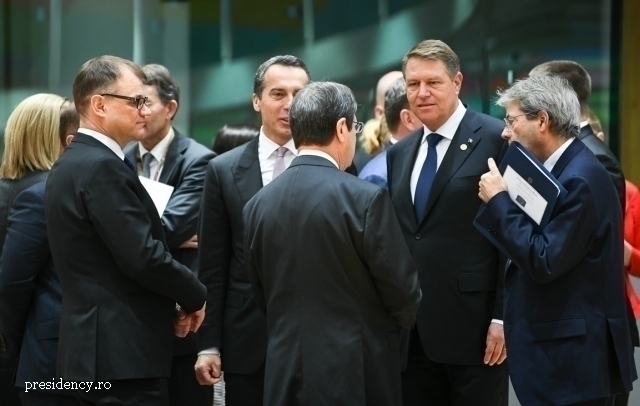The EU and common defence
The EU leaders formally established, in Brussels, the Permanent Structured Cooperation (PESCO), a plan designed to strengthen military cooperation activities.

România Internațional, 15.12.2017, 13:26
The EU leaders convened in Brussels on Thursday to approve the establishment of the Permanent Structured Cooperation, PESCO, a plan that intensifies the bloc’s military cooperation. Taking part in the project are 25 EU members, except for Denmark, Malta and obviously the UK, which is set to leave the Union in March 2019.
PESCO is designed to integrate the military command entities, military industry units and operational structures of the 25 members. Attending the meeting in Brussels, President Klaus Iohannis reiterated Romania’s commitment to contribute to making this instrument operational. According to the President of Romania, its implementation should lead to a more efficient development of military capabilities, should help avoid duplication with NATO mechanisms and should contribute to enhancing cohesion among EU countries.
As the President of the European Council, Donald Tusk, put it, it was a “historic” day for relaunching European defense. “We are launching Permanent Structured Cooperation, so-called PESCO, which is a practical expression of our will to build European defence,” Tusk added, emphasizing that this was good news for the EU allies and bad news for its enemies.
In turn, the NATO secretary general Jens Stoltenberg, invited to attend the EU summit, said PESCO would be a good thing for Europe and for NATO., in that it would provide more capabilities, generate more defense expenditure and better sharing of responsibilities.
The EU foreign policy chief Federica Mogherini hailed what she called the ‘historic decision’ of turning the EU into a “credible security provider for the world.” She mentioned that the Union, which for a long time settled for just a “soft power” role, without military weight, stepped up efforts to enhance its security after the 2014 Ukrainian crisis.
The European Council invited member states to meet their national obligations with respect to the implementation of PESCO, and called on them to carry on efforts to establish a European Defence Fund that would become operational in 2018. Starting in 2020, 1.5 billion euro would be channeled into this Fund, in order to encourage industrial research and development and to support European defence SMEs. The EU will also facilitate the use of “tactical groups,” consisting in battalions to be deployed during crises, an operation that has been hindered for more than a decade by the cumbersome political and administrative procedures involved. According to EuObserver, PESCO will cover 17 military cooperation projects, and will benefit from an initial funding of 5 billion euros.






























